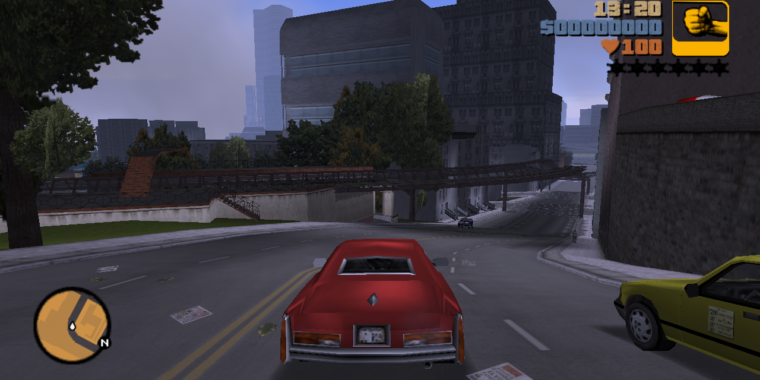
-
Shots from the reverse-engineered version of Grand Theft Auto III showing off the graphical improvements over the 2002 original.
-
The recompiled versions haven’t done anything about the ever-present fog shrouding far-off objects, unfortunately.
-
Shiny roads.
-
Cool guys walking away from sunrises.
A Github project that generated reverse-engineered code for Grand Theft Auto III and Vice City was taken down over the weekend as the result of a Digital Millennium Copyright Act request from publisher Take-Two.
The project—comprising hundreds of thousands of lines of C++ code generated over years of painstaking analysis—did not distribute any of the copyrighted image or music files needed to recompile the game. Those files needed to be sourced from an authentic copy of the PC version of the games, originally released in 2002 and 2003.
This didn’t prevent Take-Two from claiming that “the content in the links below consists of copyrighted materials owned by Take Two,” as the DMCA notice reads, in part. “The use of our copyrighted content in these links are unauthorized and it should be removed immediately.”
Is it legal?
In general, reverse-engineering source code from a compiled binary is less straightforwardly illegal than simply cracking a game’s DRM for piracy purposes, for instance. As the EFF explains, US case law includes certain fair use exceptions that can allow for this kind of decompilation work for research or interoperability purposes.
In the specific case of Grand Theft Auto, though, the game’s End User License Agreement specifically asks players to agree not to “reverse engineer, decompile, disassemble, prepare derivative works based on or otherwise modify the Software, in whole or in part.” Back in 2005, the 8th Circuit Court of Appeals upheld a similar anti-reverse-engineering EULA to take down BnetD, a reverse-engineered version of Blizzard’s Battle.net that allowed the service to be emulated on private servers.
The coder who served as the lead on the GTA reverse-engineering project, who goes by the handle aap, told Eurogamer that the team was “very much worried about” the possibility of this kind of takedown and “tried to stay under the radar for as long as possible” as a result of that worry. “We got a lot of attention when the Switch port happened [in September] but nothing from Take-Two. We took that as a sign that they don’t care (or are really blind).”
Aap added that the team felt it was a good sign that an earlier effort to reverse-engineer Super Mario 64 hadn’t yet been taken down from Github “because Nintendo is about as aggressive as Take-Two in these matters.”
Take-Two and developer Rockstar Games have previously gone after modders who were creating an alternative online playspace for Grand Theft Auto V, which the companies said was “facilitating piracy.” Those efforts briefly roped in some single-player mods for the game as well before Rockstar reversed itself. Take-Two has also actively pursued in court the makers of paid online cheating tools for its games.
Regardless of the Github takedown, the files involved in the reverse-engineering project are still out there, and no amount of legal wrangling will ever fully remove all of the copies floating around the Internet. That also applies to ports of the games for systems like the Switch and PlayStation Vita, which were enabled by the reverse-engineering project.
https://arstechnica.com/?p=1744197

